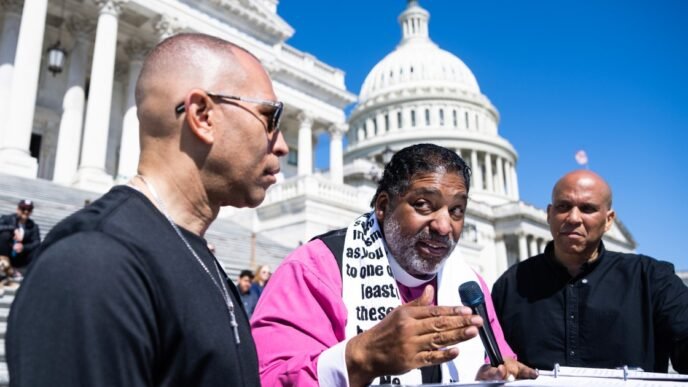President Donald Trump’s tariffs rollout is frustrating U.S. companies’ planning for the rest of the year, preventing some corporate giants from telling investors what to expect and scrambling the broader outlook for stocks.
Mattel and Ford each suspended their 2025 financial forecasts on Monday.
The toy giant told investors that “given the volatile macroeconomic environment and evolving U.S. tariff landscape, it is difficult to predict consumer spending and Mattel’s U.S. sales in the remainder of the year and holiday season.”
The company said that Barbie and Hot Wheels, its two flagship brands, were mostly manufactured outside of China, which faces a 145% effective tariff rate from the Trump administration. Still, CEO Ynon Kreiz told CNBC on Tuesday morning that Mattel was considering hiking prices for U.S. consumers to offset the costs of tariffs, which it estimated could come to about $270 million.
“Where necess, we will be taking pricing action in the U.S.,” Kreiz said.
Mattel shares have declined by about 25% since Febru, when Trump first began discussing tariffs in greater detail. By comparison, the broader S&P 500 fell about 8% over the same period.
“The shape of the toy industry has really changed,” said Brian Benway, senior tech and gaming analyst at the market research firm Mintel, who noted that Mattel’s products are increasingly sold in big-box retailers that are vulnerable to supply-chain snarls. The company said during its earnings call that it was prepared to increase direct imports to help stores keep shelves stocked.
“Could we spin up more U.S.-based production? Yes. Will it be in the next five to 10 years? Probably not,” Benway said.
Ford, too, put its outlook for the year on hold this week, citing lack of clarity about potential retaliatory tariffs from other countries, as well as how consumers may react to price increases. It joined other automakers including Dodge and Ram maker Stellantis, Volvo and Mercedes-Benz in pulling its annual guidance.
Ford CEO Jim Farley warned the company’s hit from tariffs would be “huge.” Ford builds several models in Mexico that are sold in the U.S., including the popular electric Mustang Mach-E, Maverick pickup truck and Bronco Sport.
Trump has softened his stance on tariffs somewhat, but so far no trade deals have materialized. That has left large and small companies alike facing tremendous uncertainty over how much the trade duties could hit their bottom lines.
Meanwhile, Trump has continued to downplay the potential impact to consumers from tariffs despite campaigning on immediate economic relief. He told NBC News’ Kristen Welker on Sunday that Americans should in some cases be making do with less.
“I’m just saying [Americans] don’t need to have 30 dolls, they can have three,” he said. “They don’t need to have 250 pencils,” he said. “They can have five.”
Other companies are issuing multiple forecasts that take into account different economic scenarios. United Airlines said last month that “a single consensus no longer exists, and therefore the Company’s expectation has become bimodal — either the U.S. economy will remain weaker but stable, or the U.S. may enter into a recession.” Most other major airlines, including American, Delta and JetBlue, also either warned of lower earnings or suspended some guidance.
Even some tech companies, many of which were thought to be largely immune from tariffs, signaled they could no longer forecast near-term financial results. That includes Snapchat parent Snap, which declined to issue guidance for the second quarter. But so far, stock investors have been relatively sanguine about the growing chorus of companies admitting they cannot navigate the current environment.
Last week, the S&P 500 returned to the level it had reached before Trump gave his “Liberation Day” speech on April 2, after suffering weeks of heavy losses, though the index ended Monday in the red and was off to a rough start again Tuesday.
“This is a tricky time for investors,” Goldman Sachs Chief Jan Hatzius said in a recent note to clients. “While the economy has held up a touch better than expected so far, it’s very early.” All things considered, he said, the recent rally is likely to dissipate in the face of what are likely to be “significant price hikes, supply chain disruptions, and job losses.”
Other major companies reporting earnings this week include Disney, Burger King parent Restaurant Brands International, Warner Bros. Discovery and Uber.













